1. 5 techniques to speak any language
One of the many questions that Polyglots face is that, ‘How did you do it? How did you go about learning all these different languages?’
Of all the techniques to learn a new language, the most important one is to love and enjoy every single moment in the process. Making mistakes is no sin; make mistakes and learn from them. Also, stick to a person who is detail oriented and has an impeccable knowledge of the language and who also lets you make mistakes and correct them too. Most importantly, ‘use the language’, conversate more and more!
2. Identifying yourself through language
In a way or the other we deeply care about our identity and the way that we present ourselves to others, and language can play a very significant role in doing so. It is reflected through our accent, our word choice or our spelling. It is also sometimes clear by how we pronounce or spell things or even by what names do we give them. For e.g. a winter hat in Canada is called toque, whereas a beanie in America.
Lastly, remember that whatever we say or write is a reflection of who we are!
3. How language shapes the way we think

Humans have a beautiful gift over all the other creatures on this planet, i.e. Language. Using language, we can exchange ideas and transmit thoughts. To add to it, there are over 7000 languages that are spoken around the world and all are unique in their own way.
There is an aboriginal community (Kuuk Thaayorre) in Australia who do not use words like ‘left’ and ‘right’, and instead use cardinal directions (north, south, east and west) to indicate everything. Sounds interesting, right? This way of speaking keeps you really oriented and focused.
Interesting fact: There are some languages in the world that do not have exact number words. Also, some languages have a distinct way of denoting colors. Some languages have lots of words for colors, some only have a couple ‘light’ and ‘dark’.
4. You are fluent in this language (and don’t even know it)
Humans are fluent in a language that we are probably not even aware of. We are fluent in the language of reading images. Nobody teaches us to read an image or rather decipher it; it comes from within. Language is such a thing which simplifies very a complex idea and converts it into a very simple thing. With the help of images and drawings also we can exchange such ideas. The best examples are when we take public transports for instance: the symbols and signs help us understand every basic step that needs to be followed. Also, drawings can create humor and evoke emotions too. The language of reading images is a very strong language that prevails in this era, and the right use of this skill can diversify the language world.
5. Lost in Translation
We all know the various benefits of multilingualism, but have you ever wondered how language and culture are constantly molding each other? Being multilingual increases your cognitive ability and problem-solving skills. Language learning can also be defined as creating a liaison not just between two people, but between two different worlds. While learning a language always keep in mind that you cannot learn a language efficiently until you have completely delved into its key slang terms and mannerisms.
But what must be always kept in mind is: “you forgot your language, you have forgotten your heritage.”
By Suvarna Choudhary

